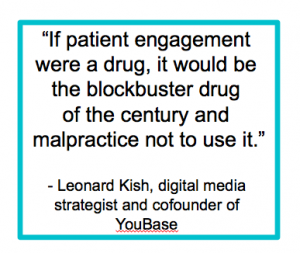PUBLISHED: 17th August 2017

by Lisa Schlager
Historically, the only role for patients in cancer research was as a subject enrolled in a clinical trial. Research generally focused exclusively on outcomes such as overall survival and neglected to account for variables such as side effects and quality of life. Engaging patients as advisors in research—reviewing study design, informed consent documents, recruitment materials, etc.—is becoming more prevalent because it makes the research and its results more relevant for patients.
Advocacy Organizations Champion Patient Engagement
Patient organizations have pioneered much of this growing practice at the grassroots level and have worked to fill the need for trained patient advocates who can weigh in on research. In fact, we created the FORCE Research Advocate Training (FRAT) Program in 2012 to address an overwhelming need for increased patient participation in the development of therapies and medical devices. FRAT trains members of our community and matches them to opportunities to serve as research advocates. Historically, the hereditary cancer community has been underrepresented in national research and policy initiatives. FRAT was a crucial step in preparing and mobilizing members of our community to assume a greater role in guiding research that impacts those affected by hereditary cancer.
Industry Joins the Movement
 Now industry, including pharmaceutical and device manufacturers, is recognizing the value of consumer input and working on changing their culture and infrastructure to engage patients directly in product development. For this reason, FORCE is proud to be working with Bayer Pharmaceuticals as one of five members of its Patient Advocacy Advisory Council (PAAC). Over the past year, the PAAC has worked with Bayer to develop a framework for successful integration of patient experts into its clinical trials. As part of this collaboration, we are helping Bayer develop its own patient advocate training platform, advocate job description, and patient expert selection criteria. Kate Robins, an ovarian cancer survivor and FRAT graduate is serving as Bayer’s first patient expert, working closely with the clinical research team in a Phase II ovarian cancer trial, and serving as a PAAC advisor.
Now industry, including pharmaceutical and device manufacturers, is recognizing the value of consumer input and working on changing their culture and infrastructure to engage patients directly in product development. For this reason, FORCE is proud to be working with Bayer Pharmaceuticals as one of five members of its Patient Advocacy Advisory Council (PAAC). Over the past year, the PAAC has worked with Bayer to develop a framework for successful integration of patient experts into its clinical trials. As part of this collaboration, we are helping Bayer develop its own patient advocate training platform, advocate job description, and patient expert selection criteria. Kate Robins, an ovarian cancer survivor and FRAT graduate is serving as Bayer’s first patient expert, working closely with the clinical research team in a Phase II ovarian cancer trial, and serving as a PAAC advisor.
Read this Medium.com article written by Carsten Brunn, Head of Pharmaceuticals, Americas Region, at Bayer. Effective patient engagement requires significant time and investment. Bayer is wholeheartedly embracing the concept, starting at the top.
This is only one example of how FORCE collaborates with industry partners to ensure that the needs of the hereditary cancer community are incorporated into research. We routinely work with drug development companies, device manufacturers, genetic testing labs, and others—reminding them that their studies, devices, and tests impact real people.
The days of paternalistic practices where researchers, industry, and policy-makers established research priorities absent of patient input are waning but challenges remain as we strive to ensure that patients have a meaningful role at the table. We are working to help establish best practices to guide successful patient involvement at all levels of research. We need to do a better job of engaging populations that have been underrepresented in traditional research and health care settings.
Nevertheless, the patient community has been the greatest force driving change as we have become more active, informed, and influential. Most of us have heard the buzzwords patient engagement, patient-centered care, personalized or precision medicine. Regardless of what you call it, patients are the key. A system oriented around and responsive to patient priorities, preferences, and values—ultimately yielding improved health outcomes—is the goal. This is the promise of patient-centricity.
POSTED IN: Research
TAGS: Hereditary Cancer Research , Patient Advocacy , Patient-centered Outcomes , Patient Engagement , Cancer Research , Precision Medicine
1 Comments
August 27, 2018
[…] year ago, I wrote a blog titled “Working with Industry to Increase Patient Engagement in Drug Development.” In it, I shared that FORCE is a member of Bayer Pharmaceutical’s 5-member Patient Advocacy […]
FORCE Co-Authors Paper on Engaging Patient Advocates in Research - Facing Our Risk of Cancer Empowered - Facing Our Risk of Cancer Empowered
Reply
